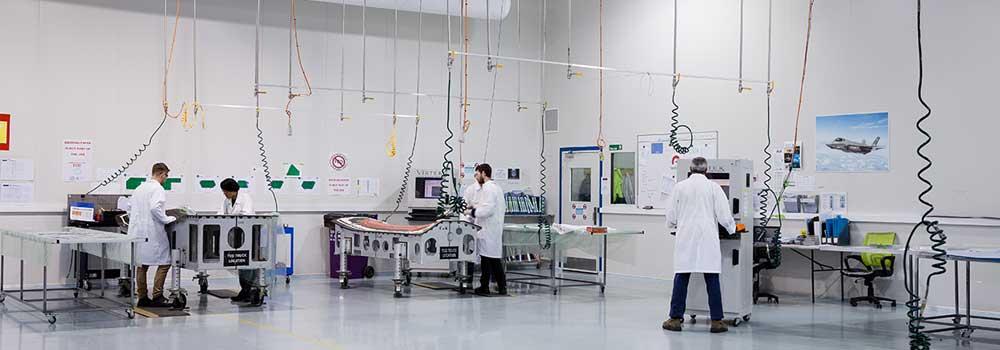Denna sida finns för närvarande inte på ditt språk. Du kan
översätta
den automatiskt
med Google Translate. Vi ansvarar inte för att tillhandahålla denna tjänst och
vi har inte kontrollerat översättningsresultaten.
Kontakta oss om du behöver ytterligare hjälp.
Quickstep Technologies halves part set up time
Quickstep Technologies halves part set up time utilising Renishaw's RMP600 radio probe, MSP's NC-Checker and NC-PerfectPart.
Introduction
The combination of MSP's NC-Checker and NC-PerfectPart software is delivering significant savings for Quickstep Technologies' manufacturing processes. MSP are leading experts in developing and implementing precision metrology software, helping companies within various sectors, such as the Aerospace, Formula 1, and Defence industries, produce 100% accurate parts. Their innovative software makes manufacturing processes more efficient and helps customers, like Quickstep Technologies, reduce costs, scrap parts and manufacturing time significantly.
As the largest independent aerospace grade advanced composites manufacturer in Australia, Quickstep Technologies located in Bankstown New South Wales, has a global reach that sees it working for customers in the aerospace, defence and other advanced manufacturing sectors. In supporting these customers, it provides complex composite part manufacture and assemblies for ‘build to print' applications, making use of conventional autoclave-based manufacturing and leading proprietary out-of-autoclave production techniques including its patented QURE process. In addition, Quickstep Technologies also provides design, development and manufacture of complex engineered products.
Quickstep Technologies provides advanced composite solutions to customers including Northrop Grumman, for who it is an approved supplier for the international F-35 Lightning II Joint Strike Fighter (JSF) program. The company is the global supplier of composite wing flaps to Lockheed Martin for the military C-130J ‘Super Hercules' and commercial LM-100J transport aircraft contracts, which have recently been extended to 2024. It also works closely with BAE Systems PLC and Boeing Defense.
Background
The JSF program requires the supply of high-precision composite manufacturing and involves a high degree of precision machining, specifically five-axis work for parts, and therefore consistency, qualification, documentation and traceability were pre-requisites for this contract. Confidence in the machining and quality process was also paramount and both Quickstep Technologies and its customer had to be confident that the equipment and processes could deliver the job.
At its state-of-the-art aerospace manufacturing facility at Bankstown airport, Quickstep Technologies introduced NC-Checker and NC-PerfectPart to monitor the accuracy and capability of their five-axis machining. Doing so also enabled Quickstep Technologies to qualify its Breton five-axis machining centres and give their customers the confidence that Quickstep's manufacturing processes meet their exacting standards.
Customising a programme within NC-PerfectPart, also resulted in a considerable reduction of rework on surface profile inaccuracies. Last year we achieved a 75% reduction in this rework and this year are aiming for gold.
Quickstep Technologies (Australia)
Implementation of MSP's NC-PerfectPart and NC-Checker software, supported by leading probing technology, provides the detailed information required to ensure machines stay within specified parameters and improves set-up times for Quickstep Technologies' complex free-form parts.
NC-Checker first carries out a calibration check on the probe. Once this is complete, it then proceeds to carry out five-axis checks of the machine tool to check the machine's accuracy. This produces a benchmark report which shows the manufacturer if their machine is capable of machining parts to tolerance. The software provides detailed results in a comprehensive report and can show precisely where the machine may be under-performing. This check takes minutes to complete, meaning it can be run on a regular basis to provide routine monitoring of the machine's geometry.
The parts being produced by Quickstep Technologies are complex free form shapes, so work-holding is a major issue when using traditional manufacturing methods. Each part has a dedicated composite vacuum fixture with three or four fixed location Tooling Spheres. The centre point of the spheres are known relative to the part geometry and this information is then used to locate the fixture or part in a suitable work offset coordinate system for machining. Prior to using NC-PerfectPart, these datums were generated using
standard cycles within the Siemens control. While this achieved results, it was limited in that it was time consuming and open to human error. NC-PerfectPart fully automates this process and eliminates any human error. NC-PerfectPart removes the need to precisely position the part, saving significant time in setup.
Results
Kris Dokka, Specialist Manager, Quickstep Technologies said: “The initial results of using NC-PerfectPart and NC-Checker were a surprise; in the sense that we could now fully automate our datum setting and verification process and reduce this setup time by 50% per part (when compared to the previous method), as well as clearly understand the various geometry features and the accuracies inter-relation to each other.”
“Customising a programme within NC-PerfectPart, also resulted in a considerable reduction of rework on surface profile inaccuracies. Last year we achieved a 75% reduction in this rework and this year are aiming for Gold.”
“[With the ease of use of the software] we now have a scheduled fortnightly benchmark execution routine. In addition to this regular scheduled check, we also execute a complete benchmark routine if there is an untoward incident on any of the machines, to determine if any changes occurred in the machine geometric accuracies.This is the most efficient method of gaining confidence back in the machine accuracy status before we commit to machining a part.”
“Assessing the machine using our old methods could take anywhere between 2 and 4 days to complete, and, even then, we still couldn't easily generate readable documentation of the results to be used for further analysis. With NC-Checker, and the use of a Renishaw RMP600 radio probe, we have simplified the procedure greatly. As a result, we can now complete this check in 1-2 hours, a saving of up to 96%, freeing up valuable machine time and improving productivity. Furthermore, the data that we can now generate and the history that we are building means that we can plot trends. This in turn helps us with critical decision making regarding periodic machine maintenance schedules and alignment activities.”

In addition to being able to quickly qualify the geometric accuracy of a machine, the other key benefit of running NC-Checker is to give the user confidence that the machine is performing exactly as it is expected to in terms of axes positioning, which is particularly relevant in five-axis environments. Kris continues: “As the software is used prior to any machining, it provides us with assurance about our processes. We can understand if the machine is still capable of producing parts to the required geometric tolerances. Part analysis can be also conducted before any cutting, eliminating uncertainty and possible costly rework and/or scrap.”
Without this ability to map the machine tool with NC-Checker and qualify the accurate position of the component in the machine with NC-PerfectPart, it is virtually impossible to guarantee a perfect part, without significant time and cost implications.
Summary
Kris Dokka concludes: “Introducing NC-Checker and NC-PerfectPart means our customers have increased confidence thanks to the transparency of documents evidencing machine health and accuracies. As our customers use the same methodologies that we do now, it makes communication about these matters easy. The automation of our part setup - achieving a time saving of 50%, and the customization of our part alignment - achieving a 75% reduction in rework; not only makes our processes more efficient but reduces costs. We also gain real-time knowledge of the geometric accuracy of the machines in 1-2 hours rather than 3-4 days, freeing up valuable machine time and giving us the confidence that the machine/component setup is as good as is required.”
Quickstep Technologies will include the full range of MSP software as well as the soon to be released MSP plug in NC-Inspect, which simplifies the generation of probing programmes from CAD systems, as standard on all future five-axis machines.
MSP is a Renishaw associate company.



